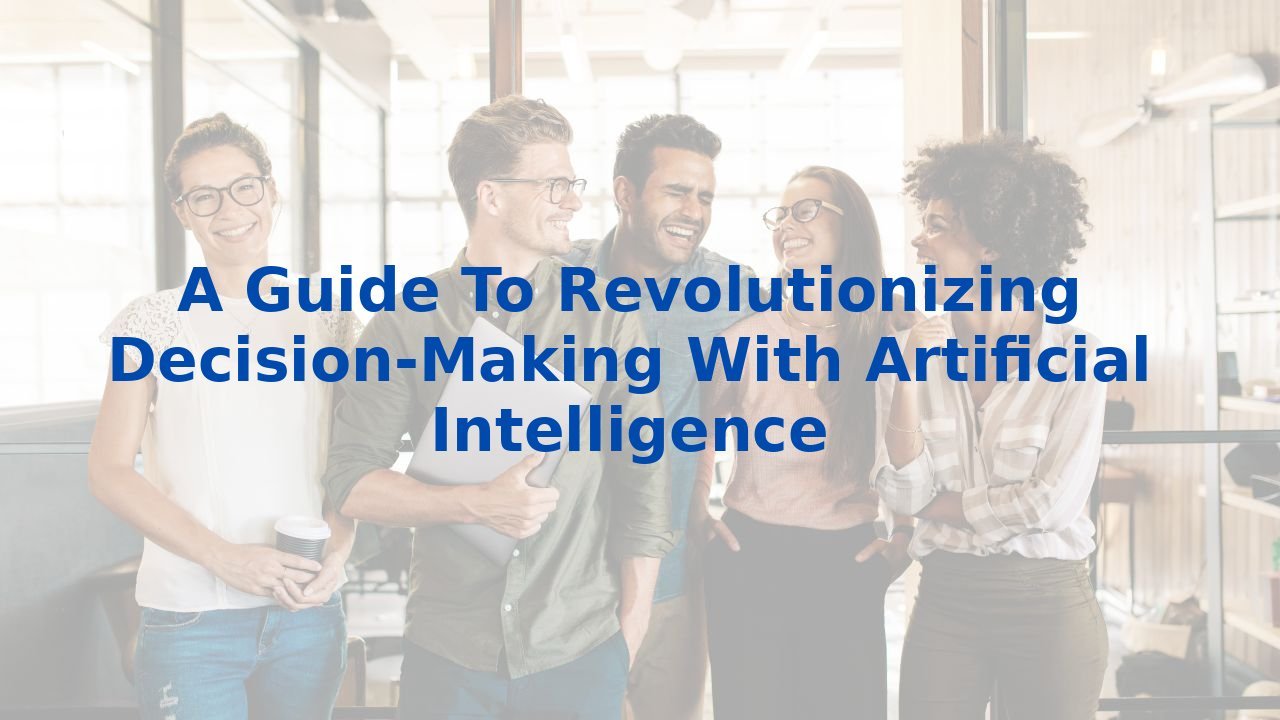A Guide To Revolutionizing Decision-Making With Artificial Intelligence
A Guide To Revolutionizing Decision-Making With Artificial Intelligence
The landscape of decision-making is shifting beneath our feet as artificial intelligence (AI) steps into the limelight. No longer just a fringe technology, AI is now central to how organizations operate and innovate. In a world bustling with data and noise, AI emerges as the quiet ally that can help streamline processes, uncover insights, and sharpen strategic focus. This guide will delve into how AI can enhance general business processes, revolutionizing decision-making and improving efficiency in your organization.
How AI is Transforming Decision-Making
At its core, AI is about making sense of vast amounts of data. Through advanced techniques like Machine Learning, Natural Language Processing, and Reinforcement Learning, AI illuminates pathways that may remain obscured to the human eye. Consider how AI reshapes decision-making through:
- Data Analysis: AI's ability to process and analyze enormous datasets at incredible speeds turns raw data into actionable insights. Organizations can now make informed decisions based on comprehensive analyses that capture nuances and trends that might go unnoticed.
- Automation: By automating repetitive tasks, AI liberates human resources, allowing teams to focus on strategic initiatives rather than mundane processes. This not only improves efficiency but also minimizes human error.
- Pattern Recognition: Machine learning algorithms excel at recognizing patterns within data. Businesses can leverage these insights to anticipate market changes, predict consumer behavior, and make proactive decisions.
- Real-Time Information Analysis: Real-time processing capabilities enable organizations to respond dynamically to market shifts, ensuring they remain agile and relevant.
The Benefits of Embracing AI in Decision-Making
The integration of AI into business processes heralds a plethora of advantages, empowering organizations to redefine decision-making. Key benefits of AI include:
- Enhanced Accuracy: AI minimizes human errors and biases through objective analysis and data-driven insights. The result? More accurate decision-making and less second-guessing.
- Faster Decision-Making: With the capability to analyze data in real time, AI shortens decision-making cycles, facilitating quicker responses to both opportunities and challenges.
- Improved Efficiency: Automating routine tasks not only saves time but also enables teams to channel their expertise toward more complex and creative problems.
- Better Risk Assessment: AI can analyze risk factors with immense precision, equipping decision-makers with the intelligence needed to proactively mitigate potential issues.
- Data-Driven Insights: With a keen eye for detail, AI unearths patterns that simplify complex scenarios, guiding organizations toward actionable strategies.
Navigating the Challenges of AI Implementation
Despite the clear benefits, organizations must be aware of the challenges that accompany AI deployment:
- Data Quality and Reliability: Effective AI decision-making is contingent on high-quality data. Inaccurate or untrustworthy data can lead to flawed insights, undermining trust in AI solutions.
- Ethical Concerns: Issues surrounding privacy, bias, and transparency in AI can pose significant ethical dilemmas. Organizations must prioritize ethical considerations to maintain public trust and integrity in their processes.
The Critical Role of Employee Training
To extract the maximum value from AI, employee training is not just advisable; it's essential. Here’s why investing in AI education is invaluable:
- Understanding AI Capabilities: Equipping employees with an understanding of AI's workings and applications enables them to leverage technology effectively, enriching decision-making.
- Seamless Integration: Training fosters a smooth integration of AI within workflows, enhancing the symbiotic relationship between human intuition and AI efficiency.
- Addressing Ethical Concerns: Training can also tackle the ethical aspects of AI, empowering employees to make responsible decisions that reflect the organization's values.
Conclusion
AI stands as a groundbreaking force in decision-making, enhancing accuracy, speed, and overall efficiency. While the journey to successful AI integration may contain hurdles, the potential rewards far outweigh the risks. The path forward involves harnessing AI’s capabilities while continuously evolving workplace skills through comprehensive training initiatives. Embrace AI not just as a tool, but as a transformative ally that paves the way for smarter, faster, and more responsible decision-making. As the AI landscape continues to evolve, stay informed about the latest developments and recognize how they can propel your organization into a future replete with possibilities.



